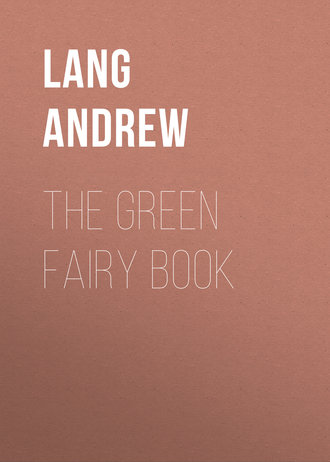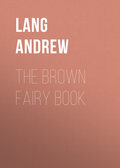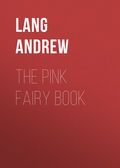
Lang Andrew
The Green Fairy Book
THE GOLDEN LADS
A poor man and his wife lived in a little cottage, where they supported themselves by catching fish in the nearest river, and got on as best they could, living from hand to mouth. One day it happened that when the fisherman drew in his net he found in it a remarkable fish, for it was entirely of gold. As he was inspecting it with some surprise, the fish opened its mouth and said: 'Listen to me, fisher; if you will just throw me back into the water I'll turn your poor little cottage into a splendid castle.'
The fisher replied: 'What good, pray, will a castle be to me if I have nothing to eat in it?'
'Oh,' said the gold fish, 'I'll take care of that. There will be a cupboard in the castle, in which you will find dishes of every kind of food you can wish for most.'
'If that's the case,' said the man, 'I've no objection to oblige you.'
'Yes,' observed the fish, 'but there is one condition attached to my offer, and that is that you are not to reveal to a soul where your good fortune comes from. If you say a word about it, it will all vanish.'
The man threw the fish back into the water, and went home. But on the spot where his cottage used to stand he found a spacious castle. He opened his eyes wide, went in and found his wife dressed out in smart clothes, sitting in a splendidly furnished drawing-room. She was in high spirits, and cried out: 'Oh husband! how can this all have happened? I am so pleased!'
'Yes,' said her husband, 'so am I pleased; but I'm uncommonly hungry, and I want something to eat at once.'
Said his wife, 'I've got nothing, and I don't know where anything is in this new house.'
'Never mind,' replied the man. 'I see a big cupboard there. Suppose you unlock it.'
When the cupboard was opened they found meat, cakes, fruit, and wine, all spread out in the most tempting fashions. The wife clapped her hands with joy, and cried: 'Dear heart! what more can one wish for?' and they sat down and ate and drank.
When they had finished the wife asked, 'But husband, where do all these riches come from?'
'Ah!' said he, 'don't ask me. I dare not tell you. If I reveal the secret to anyone, it will be all up with us.'
'Very well,' she replied, 'if I'm not to be told, of course I don't want to know anything about it.'
But she was not really in earnest, for her curiosity never left her a moment's peace by day or night, and she teazed and worried her husband to such a pitch, that at length he quite lost patience and blurted out that it all came from a wonderful golden fish which he had caught and set free again. Hardly were the words well out of his mouth, when castle, cupboard, and all vanished, and there they were sitting in their poor little fishing hut once more.
The man had to betake himself to his former trade, and set to fishing again. As luck would have it, he caught the golden fish a second time.
'Now listen,' said the fish, 'if you'll throw me back into the water, I'll give you back the castle and the cupboard with all its good things; but now take care, and don't for your life betray where you got them, or you'll just lose them again.'
'I'll be very careful,' promised the fisher, and threw the fish back into the water. When he went home he found all their former splendour restored, and his wife overjoyed at their good fortune. But her curiosity still continued to torment her, and after restraining it with a great effort for a couple of days, she began questioning her husband again, as to what had happened, and how he had managed.
The man kept silence for some time, but at last she irritated him so much that he burst out with the secret, and in one moment the castle was gone, and they sat once more in their wretched old hut.
'There!' exclaimed the man, 'you would have it – now we may just go on short commons.'
'Ah!' said his wife, 'after all I'd rather not have all the riches in the world if I can't know where they come from – I shall not have a moment's peace.'
The man took to his fishing again, and one day fate brought the gold fish into his net for the third time. 'Well,' said the fish, 'I see that I am evidently destined to fall into your hands. Now take me home, and cut me into six pieces. Give two bits to your wife to eat, two to your horse, and plant the remaining two in your garden, and they will bring you a blessing.'
The man carried the fish home, and did exactly as he had been told. After a time, it came to pass that from the two pieces he had planted in the garden two golden lilies grew up, and that his horse had two golden foals, whilst his wife gave birth to twin boys who were all golden.
The children grew up both tall and handsome, and the foals and the lilies grew with them.
One day the children came to their father and said, 'Father, we want to mount on golden steeds, and ride forth to see the world.'
Their father answered sadly, 'How can I bear it if, when you are far away, I know nothing about you?' and they said, 'The golden lilies will tell you all about us if you look at them. If they seem to droop, you will know we are ill, and if they fall down and fade away, it will be a sign we are dead.'
So off they rode, and came to an inn where were a number of people who, as soon as they saw the two golden lads, began to laugh and jeer at them. When one of them heard this, his heart failed him, and he thought he would go no further into the world, so he turned back and rode home to his father, but his brother rode on till he reached the outskirts of a huge forest. Here he was told, 'It will never do for you to ride through the forest, it is full of robbers, and you're sure to come to grief, especially when they see that you and your horse are golden. They will certainly fall on you and kill you.' However, he was not to be intimidated, but said, 'I must and will ride on.'
So he procured some bears' skins, and covered himself and his horse with them, so that not a particle of gold could be seen, and then rode bravely on into the heart of the forest.
When he had got some way he heard a rustling through the bushes and presently a sound of voices. Someone whispered on one side of him: 'There goes someone,' and was answered from the other side: 'Oh, let him pass. He's only a bear-keeper, and as poor as any church mouse.' So golden lad rode through the forest and no harm befell him.
One day he came to a village, where he saw a girl who struck him as being the loveliest creature in the whole world, and as he felt a great love for her, he went up to her and said: 'I love you with all my heart; will you be my wife?' And the girl liked him so much that she put her hand in his and replied: 'Yes, I will be your wife, and will be true to you as long as I live.'
So they were married, and in the middle of all the festivities and rejoicings the bride's father came home and was not a little surprised at finding his daughter celebrating her wedding. He enquired: 'And who is the bridegroom?'
Then someone pointed out to him the golden lad, who was still wrapped up in the bear's skin, and the father exclaimed angrily: 'Never shall a mere bear-keeper have my daughter,' and tried to rush at him and kill him. But the bride did all she could to pacify him, and begged hard, saying: 'After all he is my husband, and I love him with all my heart,' so that at length he gave in.
However, he could not dismiss the thought from his mind, and next morning he rose very early, for he felt he must go and look at his daughter's husband and see whether he really was nothing better than a mere ragged beggar. So he went to his son-in-law's room, and who should he see lying in the bed but a splendid golden man, and the rough bearskin thrown on the ground close by. Then he slipped quietly away, and thought to himself, 'How lucky that I managed to control my rage! I should certainly have committed a great crime.'
Meantime the golden lad dreamt that he was out hunting and was giving chase to a noble stag, and when he woke he said to his bride: 'I must go off and hunt.' She felt very anxious, and begged he would stay at home, adding: 'Some mishap might so easily befall you,' but he answered, 'I must and will go.'
So he went off into the forest, and before long a fine stag, such as he had seen in his dream, stopped just in front of him. He took aim, and was about to fire when the stag bounded away. Then he started off in pursuit, making his way through bushes and briars, and never stopped all day; but in the evening the stag entirely disappeared, and when golden lad came to look about him he found himself just opposite a hut in which lived a witch. He knocked at the door, which was opened by a little old woman who asked, 'What do you want at this late hour in the midst of this great forest?'
He said, 'Haven't you seen a stag about here?'
'Yes,' said she, 'I know the stag well,' and as she spoke a little dog ran out of the house and began barking and snapping at the stranger.
'Be quiet, you little toad,' he cried, 'or I'll shoot you dead.'
Then the witch flew into a great rage, and screamed out, 'What! you'll kill my dog, will you?' and the next moment he was turned to stone and lay there immovable, whilst his bride waited for him in vain and thought to herself, 'Alas! no doubt the evil I feared, and which has made my heart so heavy, has befallen him.'
Meantime, the other brother was standing near the golden lilies at home, when suddenly one of them bent over and fell to the ground. 'Good heavens!' cried he, 'some great misfortune has befallen my brother. I must set off at once; perhaps I may still be in time to save him.'
His father entreated him, 'Stay at home. If I should lose you too, what would become of me?'
But his son replied, 'I must and will go.'
Then he mounted his golden horse, and rode off till he reached the forest where his brother lay transformed to stone. The old witch came out of her house and called to him, for she would gladly have cast her spells on him too, but he took care not to go near her, and called out: 'Restore my brother to life at once, or I'll shoot you down on the spot.'
Reluctantly she touched the stone with her finger, and in a moment it resumed its human shape. The two golden lads fell into each other's arms and kissed each other with joy, and then rode off together to the edge of the forest, where they parted, one to return to his old father, and the other to his bride.
When the former got home his father said, 'I knew you had delivered your brother, for all of a sudden the golden lily reared itself up and burst into blossom.'
Then they all lived happily to their lives' ends, and all things went well with them.
Grimm
THE WHITE SNAKE
Not very long ago there lived a King, the fame of whose wisdom was spread far and wide. Nothing appeared to be unknown to him, and it really seemed as if tidings of the most secret matters must be borne to him by the winds. He had one very peculiar habit. Every day, after the dinner table had been cleared, and everyone had retired, a confidential servant brought in a dish. It was covered, and neither the servant nor anyone else had any idea what was on it, for the King never removed the cover or partook of the dish, till he was quite alone.
This went on for some time till, one day, the servant who removed the dish was so overcome with curiosity, that he could not resist carrying it off to his own room. After carefully locking the door, he lifted the cover, and there he saw a white snake lying on the dish. On seeing it he could not restrain his desire to taste it, so he cut off a small piece and put it in his mouth.
Hardly had it touched his tongue than he heard a strange sort of whispering of tiny voices outside his window. He stepped to the casement to listen, and found that the sound proceeded from the sparrows, who were talking together and telling each other all they had seen in the fields and woods. The piece of the white snake which he had eaten had enabled him to understand the language of animals.
Now on this particular day, it so happened that the Queen lost her favourite ring, and suspicion fell on the confidential servant who had access to all parts of the palace. The King sent for him, and threatened him angrily, saying that if he had not found the thief by the next day, he should himself be taken up and tried.
It was useless to assert his innocence; he was dismissed without ceremony. In his agitation and distress, he went down to the yard to think over what he could do in this trouble. Here were a number of ducks resting near a little stream, and pluming themselves with their bills, whilst they kept up an animated conversation amongst themselves. The servant stood still listening to them. They were talking of where they had been waddling about all the morning, and of the good food they had found, but one of them remarked rather sadly, 'There's something lying very heavy on my stomach, for in my haste I've swallowed a ring, which was lying just under the Queen's window.'
No sooner did the servant hear this than he seized the duck by the neck, carried it off to the kitchen, and said to the cook, 'Suppose you kill this duck; you see she's nice and fat.'
'Yes, indeed,' said the cook, weighing the duck in his hand, 'she certainly has spared no pains to stuff herself well, and must have been waiting for the spit for some time.' So he chopped off her head, and when she was opened there was the Queen's ring in her stomach.
It was easy enough now for the servant to prove his innocence, and the King, feeling he had done him an injustice, and anxious to make some amends, desired him to ask any favour he chose, and promised to give him the highest post at Court he could wish for.
The servant, however, declined everything, and only begged for a horse and some money to enable him to travel, as he was anxious to see something of the world.
When his request was granted, he set off on his journey, and in the course of it he one day came to a large pond, on the edge of which he noticed three fishes which had got entangled in the reeds and were gasping for water. Though fish are generally supposed to be quite mute, he heard them grieving aloud at the prospect of dying in this wretched manner. Having a very kind heart he dismounted and soon set the prisoners free, and in the water once more. They flapped with joy, and stretching up their heads cried to him: 'We will remember, and reward you for saving us.'
He rode further, and after a while he thought he heard a voice in the sand under his feet. He paused to listen, and heard the King of the Ants complaining: 'If only men with their awkward beasts would keep clear of us! That stupid horse is crushing my people mercilessly to death with his great hoofs.' The servant at once turned into a side path, and the Ant-King called after him, 'We'll remember and reward you.'
The road next led through a wood, where he saw a father and a mother raven standing by their nest and throwing out their young: 'Away with you, you young rascals!' they cried, 'we can't feed you any longer. You are quite big enough to support yourselves now.' The poor little birds lay on the ground flapping and beating their wings, and shrieked, 'We poor helpless children, feed ourselves indeed! Why, we can't even fly yet; what can we do but die of hunger?' Then the kind youth dismounted, drew his sword, and killing his horse left it there as food for the young ravens. They hopped up, satisfied their hunger, and piped: 'We'll remember, and reward you!'
He was now obliged to trust to his own legs, and after walking a long way he reached a big town. Here he found a great crowd and much commotion in the streets, and a herald rode about announcing, 'The King's daughter seeks a husband, but whoever would woo her must first execute a difficult task, and if he does not succeed he must be content to forfeit his life.' Many had risked their lives, but in vain. When the youth saw the King's daughter, he was so dazzled by her beauty, that he forgot all idea of danger, and went to the King to announce himself a suitor.
On this he was led out to a large lake, and a gold ring was thrown into it before his eyes. The King desired him to dive after it, adding, 'If you return without it you will be thrown back into the lake time after time, till you are drowned in its depths.'
Everyone felt sorry for the handsome young fellow, and left him alone on the shore. There he stood thinking and wondering what he could do, when all of a sudden he saw three fishes swimming along, and recognised them as the very same whose lives he had saved. The middle fish held a mussel in its mouth, which it laid at the young man's feet, and when he picked it up and opened it, there was the golden ring inside.
Full of delight he brought it to the King's daughter, expecting to receive his promised reward. The haughty Princess, however, on hearing that he was not her equal by birth despised him, and exacted the fulfilment of a second task.
She went into the garden, and with her own hands she strewed ten sacks full of millet all over the grass. 'He must pick all that up to-morrow morning before sunrise,' she said; 'not a grain must be lost.'
The youth sat down in the garden and wondered how it would be possible for him to accomplish such a task, but he could think of no expedient, and sat there sadly expecting to meet his death at daybreak.
But when the first rays of the rising sun fell on the garden, he saw the ten sacks all completely filled, standing there in a row, and not a single grain missing. The Ant-King, with his thousands and thousands of followers, had come during the night, and the grateful creatures had industriously gathered all the millet together and put it in the sacks.
The King's daughter came down to the garden herself, and saw to her amazement that her suitor had accomplished the task she had given him. But even now she could not bend her proud heart, and she said, 'Though he has executed these two tasks, yet he shall not be my husband till he brings me an apple from the tree of life.'
The young man did not even know where the tree of life grew, but he set off, determined to walk as far as his legs would carry him, though he had no hope of ever finding it.
After journeying through three different kingdoms he reached a wood one night, and lying down under a tree prepared to go to sleep there. Suddenly he heard a sound in the boughs, and a golden apple fell right into his hand. At the same moment three ravens flew down to him, perched on his knee and said, 'We are the three young ravens whom you saved from starvation. When we grew up and heard you were searching for the golden apple, we flew far away over the seas to the end of the world, where the tree of life grows, and fetched the golden apple for you.'
Full of joy the young man started on his way back and brought the golden apple to the lovely Princess, whose objections were now entirely silenced. They divided the apple of life and ate it together, and her heart grew full of love for him, so they lived together to a great age in undisturbed happiness.
Grimm
THE STORY OF A CLEVER TAILOR
Once upon a time there lived an exceedingly proud Princess. If any suitor for her hand ventured to present himself, she would give him some riddle or conundrum to guess, and if he failed to do so, he was hunted out of the town with scorn and derision. She gave out publicly that all comers were welcome to try their skill, and that whoever could solve her riddle should be her husband.
Now it happened that three tailors had met together, and the two elder thought, that after having successfully put in so many fine and strong stitches with never a wrong one amongst them, they were certain to do the right thing here too. The third tailor was a lazy young scamp who did not even know his own trade properly, but who thought that surely luck would stand by him now, just for once, for, if not, what was to become of him?
The two others said to him, 'You just stay at home, you'll never get on much with your small allowance of brains.' But the little tailor was not to be daunted, and said he had set his mind on it and meant to shift for himself, so off he started as though the whole world belonged to him.
The three tailors arrived at Court, where they had themselves duly presented to the Princess, and begged she would propound her riddles, 'for,' said they, 'here were the right men at last, with wits so sharp and so fine you might almost thread a needle with them.'
Then said the Princess, 'I have on my head two different kinds of hair. Of what colours are they?'
'If that's all,' said the first tailor, 'they are most likely black and white, like the kind of cloth we call pepper-and-salt.'
'Wrong,' said the Princess.
'Then,' said the second tailor, 'if they are not black and white, no doubt they are red and brown, like my father's Sunday coat.'
'Wrong again,' said the Princess; 'now let the third speak. I see he thinks he knows all about it.'
Then the young tailor stepped boldly to the front and said, 'The Princess has one silver and one golden hair on her head, and those are the two colours.'
When the Princess heard this she turned quite pale, and almost fainted away with fear, for the little tailor had hit the mark, and she had firmly believed that not a soul could guess it. When she had recovered herself she said, 'Don't fancy you have won me yet, there is something else you must do first. Below in the stable is a bear with whom you must spend the night, and if when I get up in the morning I find you still alive you shall marry me.'
She quite expected to rid herself of the tailor in this way, for the bear had never left anyone alive who had once come within reach of his claws. The tailor, however, had no notion of being scared, but said cheerily, 'Bravely dared is half won.'
When evening came on he was taken to the stable. The bear tried to get at him at once and to give him a warm welcome with his great paws. 'Gently, gently,' said the tailor, 'I'll soon teach you to be quiet,' and he coolly drew a handful of walnuts from his pocket and began cracking and eating them as though he had not a care or anxiety in the world. When the bear saw this he began to long for some nuts himself. The tailor dived into his pocket and gave him a handful, but they were pebbles, not nuts. The bear thrust them into his mouth, but try as he might he could not manage to crack them. 'Dear me,' thought he, 'what a stupid fool I must be – can't even crack a nut,' and he said to the tailor, 'I say, crack my nuts for me, will you?'
'You're a nice sort of fellow,' said the tailor; 'the idea of having those great jaws and not being able even to crack a walnut!' So he took the stone, quickly changed it for a nut, and crack! it split open in a moment.
'Let me try again,' said the bear; 'when I see the thing done it looks so easy I fancy I must be able to manage it myself.'
So the tailor gave him some more pebbles, and the bear bit and gnawed away as hard as he could, but I need hardly say that he did not succeed in cracking one of them.
Presently the tailor took out a little fiddle and began playing on it. When the bear heard the music he could not help dancing, and after he had danced some time he was so pleased that he said to the tailor, 'I say, is fiddling difficult?' 'Mere child's play,' replied the tailor; 'look here! you press the strings with the fingers of the left hand, and with the right you draw the bow across them, so – then it goes as easily as possible, up and down, tra la la la la – '
'Oh,' cried the bear, 'I do wish I could play like that, then I could dance whenever the fancy took me. What do you think? Would you give me some lessons?'
'With all my heart,' said the tailor, 'if you are sharp about it. But just let me look at your paws. Dear me, your nails are terribly long; I must really cut them first.' Then he fetched a pair of stocks, and the bear laid his paws on them, and the tailor screwed them up tight. 'Now just wait whilst I fetch my scissors,' said he, and left the bear growling away to his heart's content, whilst he lay down in a corner and fell fast asleep.
When the Princess heard the bear growling so loud that night, she made sure he was roaring with delight as he worried the tailor. Next morning she rose feeling quite cheerful and free from care, but when she looked across towards the stables, there stood the tailor in front of the door looking as fresh and lively as a fish in the water.
After this it was impossible to break the promise she had made so publicly, so the King ordered out the state coach to take her and the tailor to church to be married.
As they were starting, the two bad-hearted other tailors, who were envious of the younger one's happiness, went to the stable and unscrewed the bear. Off he tore after the carriage, foaming with rage. The Princess heard his puffing and roaring, and growing frightened she cried: 'Oh dear! the bear is after us and will certainly catch us up!' The tailor remained quite unmoved. He quietly stood on his head, stuck his legs out at the carriage window and called out to the bear, 'Do you see my stocks? If you don't go home this minute I'll screw you tight into them.'
When the bear saw and heard this he turned right round and ran off as fast as his legs would carry him. The tailor drove on unmolested to church, where he and the Princess were married, and he lived with her many years as happy and merry as a lark. Whoever does not believe this story must pay a dollar.







